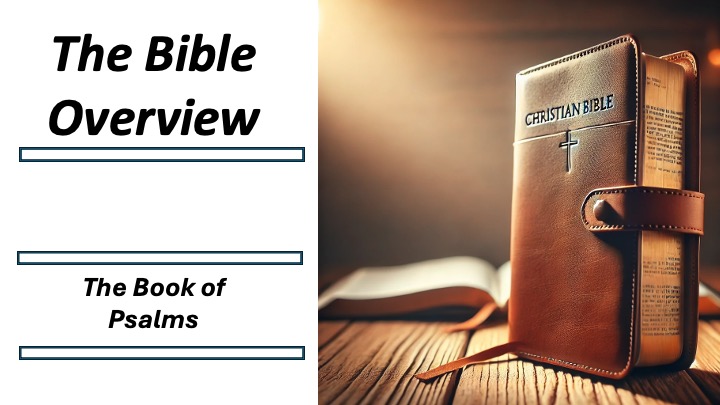Bible Overview Psalms
Mike Ervin

Overview of the Book of Psalms
The Book of Psalms is a collection of 150 poetic prayers and hymns that express a vast range of human emotions. joy, sorrow, praise, lament, and trust in God. It is often called the prayer book of the Bible and has been central to Jewish and Christian worship for centuries.
Major Themes
1. Praise and Worship: Many psalms exalt God for His greatness, power, and faithfulness (e.g., Psalms 8, 19, 29, 100, 150).
2. Lament and Complaint: The psalmists cry out to God in times of distress, seeking deliverance (e.g., Psalms 22, 42-43, 88).
3. Trust in God :Even in suffering, the psalmists declare confidence in God’s care (e.g., Psalms 23, 27, 46, 91).
4. God's Sovereignty and Justice: The psalms affirm that God rules over the world and will judge righteously (e.g., Psalms 2, 47, 96-99).
5. Messianic Hope: Many psalms point to a coming anointed king, ultimately fulfilled in Christ (e.g., Psalms 2, 22, 110).
6. Wisdom and the Law: Some psalms reflect on righteous living and the blessings of following God’s ways (e.g., Psalms 1, 19, 119).
Structure and Sequential Overview
The Psalms are divided into five books, mirroring the five books of Moses (Genesis - Deuteronomy). Each section concludes with a doxology (a praise declaration).
Book 1 (Psalms 1 - 41): The Foundations of Faith
Psalm 1 A wisdom psalm contrasting the righteous and the wicked.
Psalm 2 A messianic psalm about God’s anointed king.
Psalm 8 The majesty of God and humanity’s place in creation.
Psalm 19 The glory of God revealed in nature and His law.
Psalm 22 A prophetic psalm of suffering, later quoted by Jesus on the cross.
Psalm 23 The famous psalm of the Good Shepherd’s care.
Psalm 41 Ends with a doxology, closing Book 1.
Book 2 (Psalms 42 -72): Lament and the Hope of the Kingdom
Psalms 42-43 A deep longing for God’s presence.
Psalm 46 God is our refuge and strength.
Psalm 51 David’s confession after his sin with Bathsheba.
Psalm 67 A missionary psalm calling for all nations to praise God.
Psalm 72 A royal psalm looking forward to the reign of the Messiah.
Book 3 (Psalms 73 -89): Crisis and God’s Sovereignty
Psalm 73 Wrestling with the prosperity of the wicked.
Psalm 77 Recalling God’s past faithfulness in hard times.
Psalm 84 The joy of dwelling in God’s presence.
Psalm 89 Lament over the apparent failure of God’s covenant with David.
Book 4 (Psalms 90 - 106): God’s Eternal Kingship
Psalm 90 A psalm of Moses about the brevity of life.
Psalm 91 Trust in God’s protection.
Psalm 95 A call to worship and trust.
Psalms 96-99 Celebrate God’s reign over the earth.
Psalm 103 Praise for God’s mercy and compassion.
Book 5 (Psalms 107 - 150): Restoration and Praise
Psalm 110 A messianic psalm about the eternal priest-king.
Psalm 119 The longest psalm, celebrating God’s law.
Psalms 120-134 The Songs of Ascents, sung by pilgrims traveling to Jerusalem.
Psalm 139 God’s intimate knowledge of us.
Psalm 150 A grand doxology, calling all creation to praise God.
Conclusion
The Book of Psalms is a rich resource for prayer, worship, and theological reflection. It speaks to every aspect of the human experience, always pointing back to God’s faithfulness, justice, and ultimate plan of redemption.